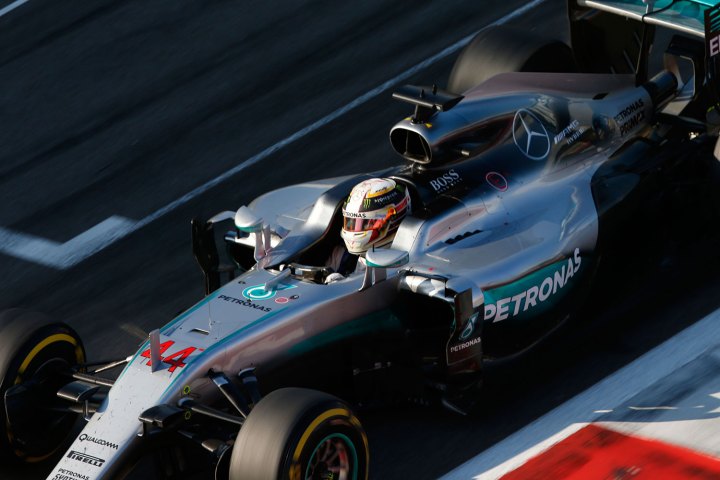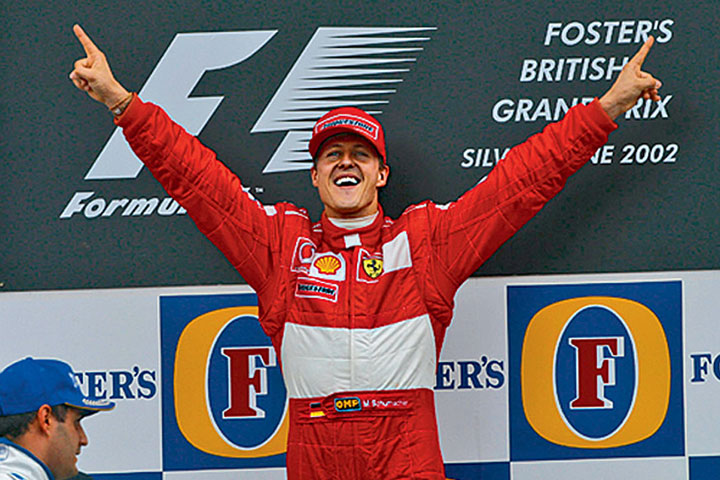
Who is the greatest Formula One driver of all time?
Maybe you’re a fan of Kimi Räikkönen, Sebastian Vettel, or Lewis Hamilton, or maybe you still hold fast to the memory of Michael Schumacher, Ayrton Senna, or Phil Hill. Formula One has crowned a champion every year since 1950, and over the past 66 years, hundreds of drivers have competed in races all over the world, and 32 have won the world championship. Of those, just 16 men have won the world championship more than once.

It would be easy enough to say that Michael Schumacher was the greatest driver of all time. He won seven championships, after all. The second place champion Juan Manuel Fangio won just five championships, all in the 1950s. But how can you ignore the fact that Schumacher raced with a very dominant Ferrari team, while Fangio raced and won with Alfa Romeo, Mercedes, Maserati, and Ferrari, and in an era with far less technology to assist him?
It would be easy enough to say that Michael Schumacher was the greatest.
If you give the topic just a little thought, you can see the magnitude of the challenge these researchers had to struggle with. But by bringing the techniques of statistical analysis to bear, they came up with an answer, and they published it in the April 2016 issue of the Journal of Quantitative Analysis in Sports.
Digital Trends caught up with Dr. Andrew Bell, Lecturer in Quantitative Social Sciences at the University of Sheffield, and he gave us some insight into the how and why of the study, as well as the final answer.
“It was actually an undergraduate, James Smith, who came to me having collated the data, wanting to use it for his dissertation. I had expertise in the methodology but didn’t know much about racing at the time beyond watching the occasional race,” Bell says.
How They Did It
Several attempts have been made over the years to quantify results and rank drivers across the history of the series, but each of these attempts has looked at different factors to normalize and assign values to individual race wins. Also, the tremendous changes in available technology over time make it hard to assess how a driver from a prior era would perform in today’s cars – or how a modern driver would manage in a car from the 1950s.

So, to get a more balanced view without inserting subjective judgments, the team looked not only at raw finishing positions, but also at the historic successes of a given driver’s team and the successes of the driver’s team in the years that the driver was with the team. By looking at team and individual results over time, the academics were able to adjust their results to take the effects of stronger and weaker teams into account when analyzing a driver’s long-term performance.
The researchers also compared results in wet weather and on street tracks, because these factors have a profound effect on driver performance. Some drivers, such as Senna, Hans-Joachim Stuck, and Schumacher, are legendary for their wet course driving abilities. Similarly, throughout the history of Formula One, there is a dramatic difference in driver and team performance on temporary or street circuits. That difference provided the researchers an alternative viewpoint on driver skill.
What They Found: Teamwork Counts
The first striking discovery that the analysts made is that Formula One racing really is a team sport. The provable quality of a team had a much greater effect on individual driver results than most fans would expect. Sorry Schumi, but it looks like you might have had a tougher career if you didn’t race for Ferrari all those years.
The first striking discovery is that Formula One racing really is a team sport.
But the same analysis is good news for Christian Fittipaldi, as the study relates:
“Perhaps the biggest surprise in our results is the high ranking of Christian Fittipaldi at number 11, despite only competing in three seasons and never making a podium finish. This ranking occurs because C. Fittipaldi consistently outperformed his team-mates, and because he never raced for a ‘good’ team, the standard required to get a high ranking is lower. More specifically, C. Fittipaldi’s teammates had relatively high rates of retirement: he gains his high ranking by being able to successfully keep a relatively poor car on the track.”
For those who aspire to a career in Formula One, or any form of racing, the message is clear: choose your team carefully, and sign with the best team you possibly can.
The Greatest of All Time
At this point you’re really only wondering about one thing: Who is the best? We won’t keep you in suspense any longer. It’s Fangio. He won 46% of all Formula One races he entered, and he did that in a period where cars were much less reliable than they are today.
The next nine drivers, in order, turned out to be Alain Prost, Jim Clark, Ayrton Senna, Fernando Alonso, Nelson Piquet, Jackie Stewart, Michael Schumacher, Emerson Fittipaldi, and Sebastian Vettel.
“Of drivers currently racing, Alonso comes out top, followed by Sebastian Vettel, Lewis Hamilton, Nico Rosberg and Jenson Button,” the study says.
Further Analysis
It would be a pity to end all the great arguments about the greatest racers of all time. So as you consider these results, bear in mind that there are still factors that could be brought into any discussion of relative greatness.
“Just like we looked at differences between wet and dry tracks, you could also look at the difference between home and away tracks,” Bell says.
Another factor that could be discussed is when a driver chooses to retire. Some, like Fangio, step out of the car while they’re at the top of their game. Most notably Michael Schumacher retired from Ferrari at the end of 2006, but returned in 2010 to race for Mercedes. From 2010 to 2012, Schumacher managed only one podium finish, a third place showing at the 2012 European Grand Prix. If you discount those years, Schumacher might rise from his eighth-place ranking.
“An alternative could be to take, say, a 3 year peak but that would arguably penalize drivers that were able to maintain their quality over their entire career compared to those that were less consistent,” Bell tells Digital Trends.


